Burkina Faso. A climate of fear and violence.
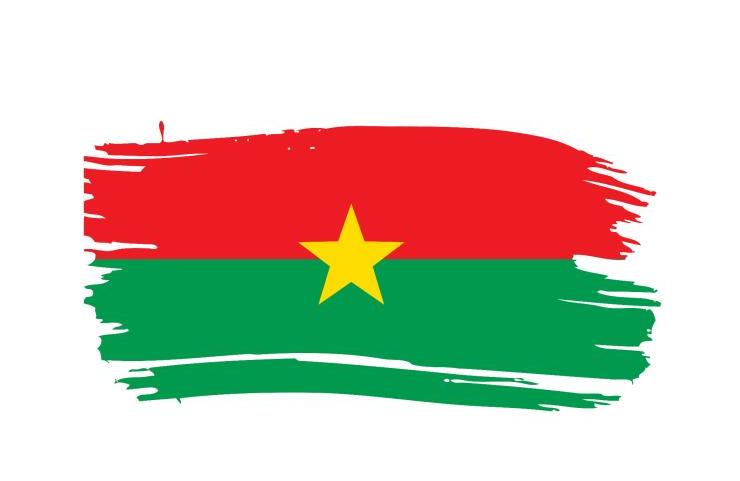
The country has long been going through a phase of instability and violence that threatens its survival. The rise to power of the military has not improved the situation. On the contrary, it has actually worsened it by aggravating a series of pre-existing problems. At this moment, there is no way out of this state of affairs, which risks having serious negative repercussions on the region.
On 20 September 2022, Captain Ibrahim Traoré, leading several branches of the armed forces, seized power in Burkina Faso, becoming the youngest head of state in the world. In doing so, he overthrew another military junta, the one led by Lieutenant Colonel Paul Henri Damiba, who had ousted President Roch Marc Christian Kabore
in January of that year.
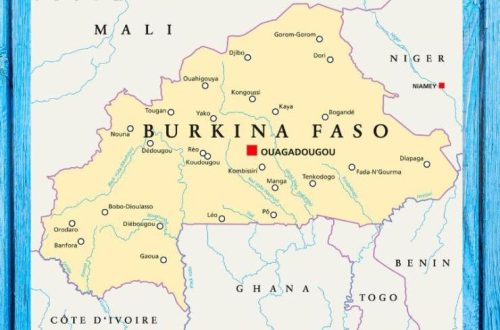
Burkina Faso Political Map with capital Ouagadougou. 123rf
Kabore was elected in 2015, after a popular uprising had put an end to the regime of Blaise Compaoré, also a military man who came to power by force in 1987.Since its independence in 1960, Burkina Faso has thus experienced several coups d’état. The weakness of its institutions has been aggravated in recent years by the aggression of jihadist groups (linked to Al Qaeda or the Islamic State) that have infiltrated the territory from neighbouring countries (especially Mali), exploiting the shortcomings of the public administration and latent ethnic and religious tensions. During the lengthy period of Compaoré’s rule, it seemed that Burkina Faso was spared regional instability and increasing attacks by jihadist groups. Compaoré had even carved out a role for himself as a regional player in mediating conflicts. But this was only an optical illusion. In reality, the progressive weakening of institutions under Compaoré due to phenomena such as corruption created the conditions for jihadists to infiltrate.
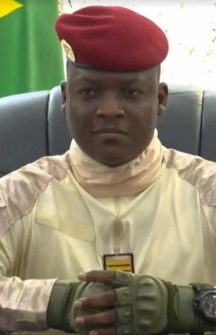
Captain Ibrahim Traoré, Transition President of Burkina Faso. Lamine Traoré / VOA
According to some sources, Traoré decided to carry out the coup because he did not agree with the way the fight against the rebels was being handled by the military high command. The problem is that at the moment he seems mainly concerned about remaining in power. His fears are fuelled by the knowledge that there is a strong resentment towards him by armed forces officers like himself, perhaps with a higher rank than his, who have been ousted. An attempt to overthrow him organised by the military and civilians was reportedly foiled in September 2023. He has profoundly changed the security forces by, among other things, creating 25 Rapid Intervention Battalions (BIR), military units loyal to him to which he gives orders directly. In addition, he increased the recruitment of the Volunteers for the Defence of the Homeland (VDP), a paramilitary corps that supports the army in the fight against extremists.Besides domestically, Traoré sought to strengthen himself internationally. First, he has forged ties with regional partners in the same situation, starting with Assimi Goita, who seized power in Mali in a coup. Then he forged ties with Moscow, especially about internal security.
A new alliance
The military junta in power in Burkina Faso has formed a strong alliance with those of Mali and Niger, and the three, which are at loggerheads with the other countries in the region, have formed the Alliance of Sahel States. On 16 September 2023, they signed the so-called Liptako-Gourma Charter, which gave birth to such an organisation. It takes its name from the region, also known as the ‘area of the three borders’, that lies on the border of the three states. This area, however, has in recent years become one of the epicentres of insecurity in the Sahel region, due to the extremist groups operating there.
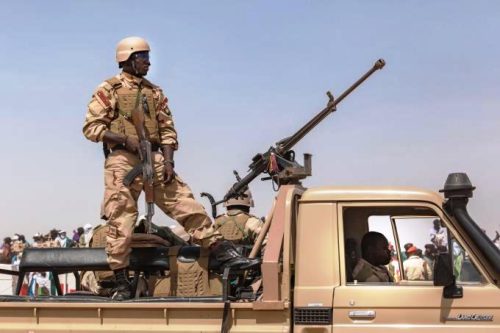
Ingall, Niger. Armed soldiers. Burkina Faso, Mali and Niger have formed the Alliance of Sahel States. Shutterstock/ Katja Tsvetkova
The Charter lays the foundation for an alliance for collective security and defence, which could be extended in the future to states in the region that share its values. In fact, among other aspects, the charter also provides for the fight against rebellions that may break out within its members. Indeed, while it contains statements of principle against external interference in the life of a state, it indicates the conditions under which members may intervene on the territory of another to suppress an insurrection. Since the three regimes have established themselves by force, it is safe to assume that the Alliance is not only an instrument to counter jihadist terrorist movements, but also a tool to ensure the three juntas remain in power in the face of a possible popular uprising (due to discontent) or a coup attempt carried out by a faction of the armed forces dissatisfied with its own condition.
Truth be told, there are doubts as to whether one of the three armies would then concretely intervene to come to the aid of another, if only because each of the three faces a considerably problematic situation in terms of security and has deficiencies in terms of equipment and training. In Burkina Faso, for example, large parts of the territory escape the control of the institutions due to the attacks of extremist groups.
But, if only in principle, the way has been cleared for armed
intervention by the allies.
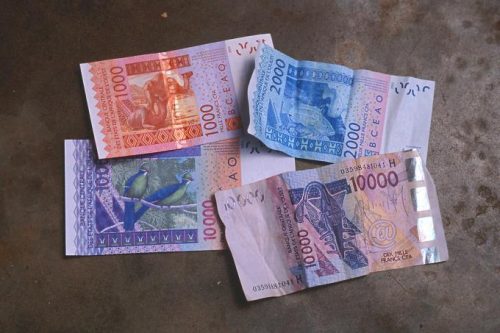
West African money CFA. iStock/ peeterv
On 28 January 2024, the three allies announced their decision to leave the Economic Community of West African States (ECOWAS), the regional political body of which they had been members until now and which had condemned the three coups in several ways. Among other things, the juntas accused ECOWAS of being influenced by foreign powers, of not supporting their fight against instability and of having implemented ‘unjust’ and ‘inhuman’ sanctions against them after the three coups.
There is also a plan for the three countries to abandon the currency common to many countries in the region, the CFA Franc (another remnant of French colonisation), and create a new currency, which should be called the ‘Sahel’. The problem is that at present there does not seem to be the economic basis to implement such a project. The idea of a new currency seems more of a propaganda initiative than a serious project. It is undoubtedly part of a broader debate, which concerns all the countries using the CFA Franc and which has led regionally to the idea of a new single currency for all members. This project has been slowed down first by the Covid-19 pandemic and then by resistance from some parties. (Open Photo: Burkina Faso Flag. 123rf)
A.C.



